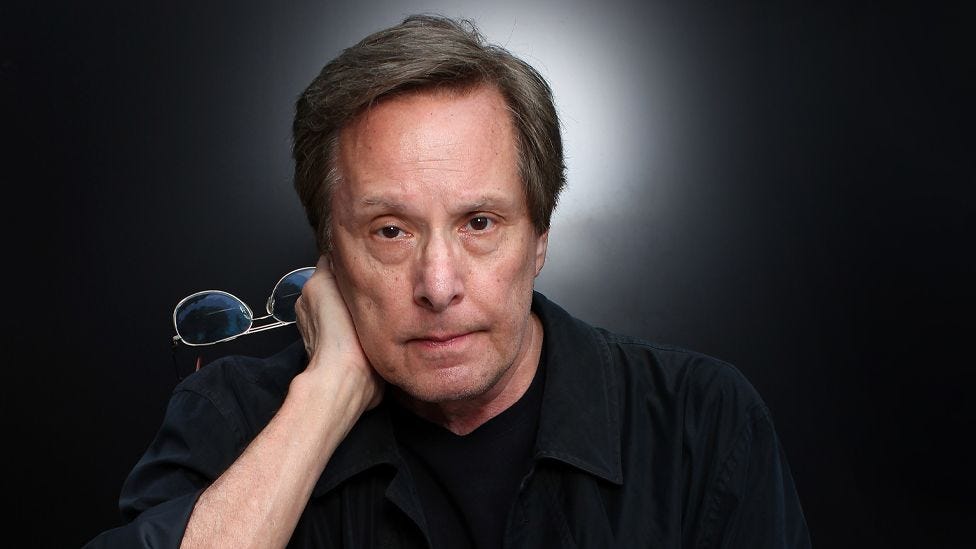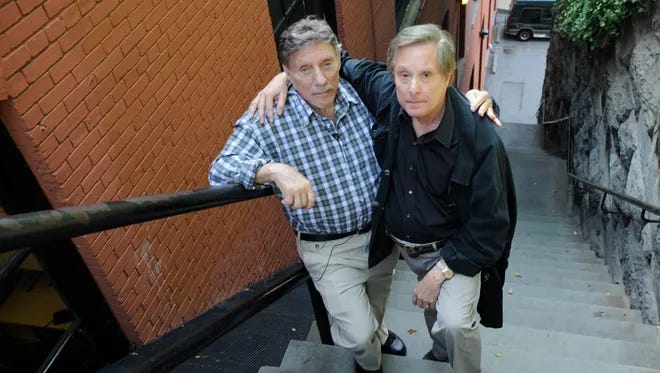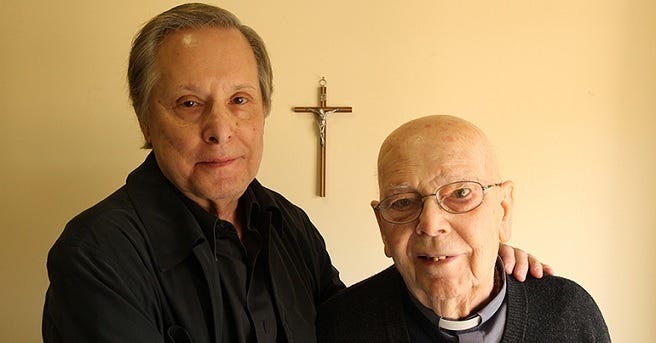THE SPIRITUAL AND HUMAN WISDOM OF WILLIAM FRIEDKIN
Ode to the man who saw in The Exorcist a story not of evil but of hope and faith.
Film director William Friedkin died yesterday at age 87. While he grew up Jewish, Friedkin is most well known for directing the Catholic horror film The Exorcist, which continues to scare the absolute shit out of people to this day.
A couple years ago I did a piece for America about the making of The Exorcist, and in researching that story I learned some wild tales about Friedkin, like how he would sometimes shoot off guns without warning to get the frightened reactions he wanted from his actors, or how he once suddenly slapped the Jesuit William O’Malley, who had a small part in the film, to get more emotion out of him.
Cinematographer Owen Ruizman later said, “Billy was reaching for the limit, he was committed to it, and he was obsessed by it himself. And that obsession was contagious.”
But for his own part, Friedkin saw the story as fundamentally a story not about the devil but about faith. “If you’re watching closely you realize that the film’s true protagonist is not the girl but the Catholic priest,” he told the Italian magazine L’Osservatore Romano in 2019. “The Catholic priest in the story is losing his own faith through various incidents in his life,” and the possession of the girl is the devil’s attempt to make him forsake his faith entirely. For Friedkin, the priest’s decision to sacrifice his life for the girl represented a final act of faith; no matter what he witnessed, still he believed there was good in the girl and that she could be saved.
Personally I’ve always thought the situation at the end was a bit more complicated. Father Karras wants to save her, certainly, but he also seems to have given up on life. And yet in a way that makes his decision to help her even more profound; he may have decided his life is not worth living, but he’s going to use his despair to help someone else.
Later in his life Friedkin frequently spoke of his devotion both to his Jewish roots and to Christianity. Decades after The Exorcist he actually did a documentary with the Vatican’s exorcist Gabriel Amorth, and was allowed to attend his first exorcism. “I was terrified,” he confides. (I so love this about him.)
His reflections on that experience and on his work in general offer a lot of wisdom, both about a life of faith and just plain being alive. As we mourn his passing, even if perhaps we hope never to see a movie as frightening as The Exorcist again, I think there are things we might learn from Friedkin about how to live a good life.
TAKE YOUR TIME.
Friedkin and Blatty on those famous Georgetown stairs.
Talking to L’Osservatore Romano, Friedkin recalls a priest would occasionally say Mass for him and The Exorcist’s writer William Peter Blatty at Friedkin’s Fire Island home on a Sunday. A lot was improvised; Friedkin had no wine, so they used cranberry juice. In place of unleavened bread they used pieces of a bagel. But those Masses were a profoundly moving experience for Friedkin. When he filmed the scene in The Exorcist where the priest says Mass, he made a point of having the priest deliver the Eucharistic prayer slowly, letting the words really speak.
“Very often you will hear Mass said in church and it’s said very quickly, it’s like ‘rattled off,” Friedkin noted to the interviewer. (And wow can that be true.) What Friedkin discovered at the Masses as his house is that when you take your time, so many layers of meaning and life that you didn’t even know were there have the chance to rise to the surface.
The same is same in his movies; Friedkin was known for his documentary-style approach. It’s through the smallest of details Friedkin believed that the story gets told and a meaningful experience is created.
There’s always a reason to be in a rush. But there’s so many other reasons to resist that. And you’ll only discover what those are if you do.
LOOK WHERE NO ONE ELSE WANTS TO.
Al Pacino in Cruising.
If you look at Friedkin’s body of work, one of the clear patterns especially in his early work is that he told stories about communities and experiences that society tried to avoid. One of his first films was the exceptional 1970 film adaptation of the play Boys in the Band, about a group of gay men who meet for dinner one night and struggle to overcome their shared self-loathing. No one wanted to talk about gay men in 1970 (including a lot of gay men).
Ten years later he did another film about the gay community, Cruising, about a serial killer in New York targeting gay men who frequent S&M bars. The film was based on real events, but ones that only the gay Village Voice reporter Arthur Bell wsa reporting on.
Even Friedkin’s Academy-Award winning film The French Connection was drawn from a documentary he did in 1966 about the New York City police force, in which he learned how thin was the boundary in police community between themselves and the criminals they pursued.
Friedkin faced blowback at times for the stories that he told. The gay community in New York City was furious that his film Cruising focused on the S&M bar community, insisting that this misrepresented them and invited violence. But he didn’t let other people determine what he saw or where he looked.
That’s such a tremendous gift—to have the courage and the patience to see what is in front of you or within you, whether society wants you to recognize it or not.
YOUR OPPONENTS ARE OFTEN AN OPPORTUNITY.
Christopher Hitchens with fellow authors and friends Ian McEwan and Martin Amis.
One of the things I really loved about Friedkin’s interview with Romano is the praise he offers for the atheist Christopher Hitchens. His arguments against Christianity, Hitchens said, “are very convincing, and he was the devil’s advocate against the Sainthood of Mother Teresa.”
I can’t speak to other religious communities, but in the Catholic Church I’ve seen critics like Hitchens or Richard Dawkins roundly dismissed, and often the reasoning seems to come down to, “Because they’re atheists.” But in fact these and other public intellectuals have highlighted many of the hypocrisies of Christianity, the ways in which faith has been used to reinforce prejudice and condone violence. And those are immensely important critiques; I don’t see how you can be a Christian if you’re not willing to face how bad Christians sometimes are, and the way in which Christian institutions have backstopped or even instigated profound acts of violence.
These issues persist. So much of the violence against queer people around the world is perpetrated by Christians, sometimes with the approval or at the suggestion of Catholic leaders. And whether the person pointing this out is a Christian or not themselves is irrelevant.
In fact, what Friedkin seems to realize is that Hitchens’ place as an outsider actually makes him a valuable resource for Christians. He sees us in ways that we on the inside may not be able to see ourselves. And so rather than an enemy, Hitchens is for Friedkin a gift, even an ally to his faith.
TRUST YOUR INSTINCTS.
I feel like this photo captures Friedkin. Rather than a director, he presents himself as an investigative journalist who is going to learn the truth and tell the story.
In many ways this is a corollary of much of what I’ve already noted. Friedkin refused to be swayed by the beliefs or expectations of others. He made films about topics others wanted kept secret; he read authors and met people that others dismissed. And also, he could hear people out and then make up his own mind. He questioned how Judas could be so hated when he was fulfilling prophesy? Amorth responded: “That’s true, but he was also not a good man. He was a thief, and he had done a lot of other things that were not really in the nature of goodness and for that reason he is condemned.”
Says Friedkin: “I still was not convinced.” That’s Friedkin in a nutshell—he listens with respect, but when he disagrees he’s able to say.
WHEN IN DARKNESS, LAUGH.
Friedkin with Gabriel Amorth.
When Friedkin sat in on an exorcism being done by Vatican Exorcist Gabriel Amorth, he was terrified. But Amorth for his own part kept a sense of humor. Before they got started he literally thumbed his nose at the demon occupying the possessed person. He did it, said Friedkin, “to take all the fear out of the room.”
“He took all the mystery away from it, and he told me a lot,” Friedkin recalls.
In The Exorcist, evil gets taken pretty seriously. But again, the final message of the film is not horror but hope. Even though Karras can’t see any future for himself, still he’s willing to try and save the girl.
There’s an ancient tradition in the Catholic Church that on Easter Sunday the priest is supposed to make the congregation laugh so hard that their voices ring from the rafters. And the idea behind this is very similar to what touches Friedkin about Amorth: the resurrection of Jesus is in a sense God thumbing his nose at the rules of existence that we believe in. And to show that we understand and that we profess this faith, there is no more powerful acclamation than laughter.
Many people will remember William Friedkin as the man that showed them the face of evil. And he himself talked throughout his life about his films as always about “the thin line between good and evil.”
But personally I hope at his funeral the laughter rings from the rafters and out the doors. Because no matter the horrors he depicted, his conclusion was not despair but hope and faith.
I wasn’t anticipating writing again until the end of the week, but when I saw the news about Friedkin, I had to chime in. I highly recommend the interview I keep referring to from L’Osservatore Romano, plus the profile Friedkin did of Amorth for Vanity Fair. (Amorth is an enormously fascinating figure in himself. Reading his books about performing exorcisms helped me understand how being an exorcist is an extension of a priest’s normal ministries.)
If you’re interested in the making of The Exorcist, my piece in America has some fun stories, too.
Also, if you’re looking for other Catholic supernatural stories with a real depth of spirituality, I highly, highly recommend the Paramount+ show Evil. I’ve worked as a consultant on the show for a number of years, and I’ve been blown away by the thoughtfulness of the writers, cast and crew.
As always, thanks for reading. If you want to help pay for the exorcist I will no doubt need at some point down the line, my paypal is paypal.me/jimmcdsj, or my Venmo is:
Thanks so much for supporting my work. It really is so appreciated.










